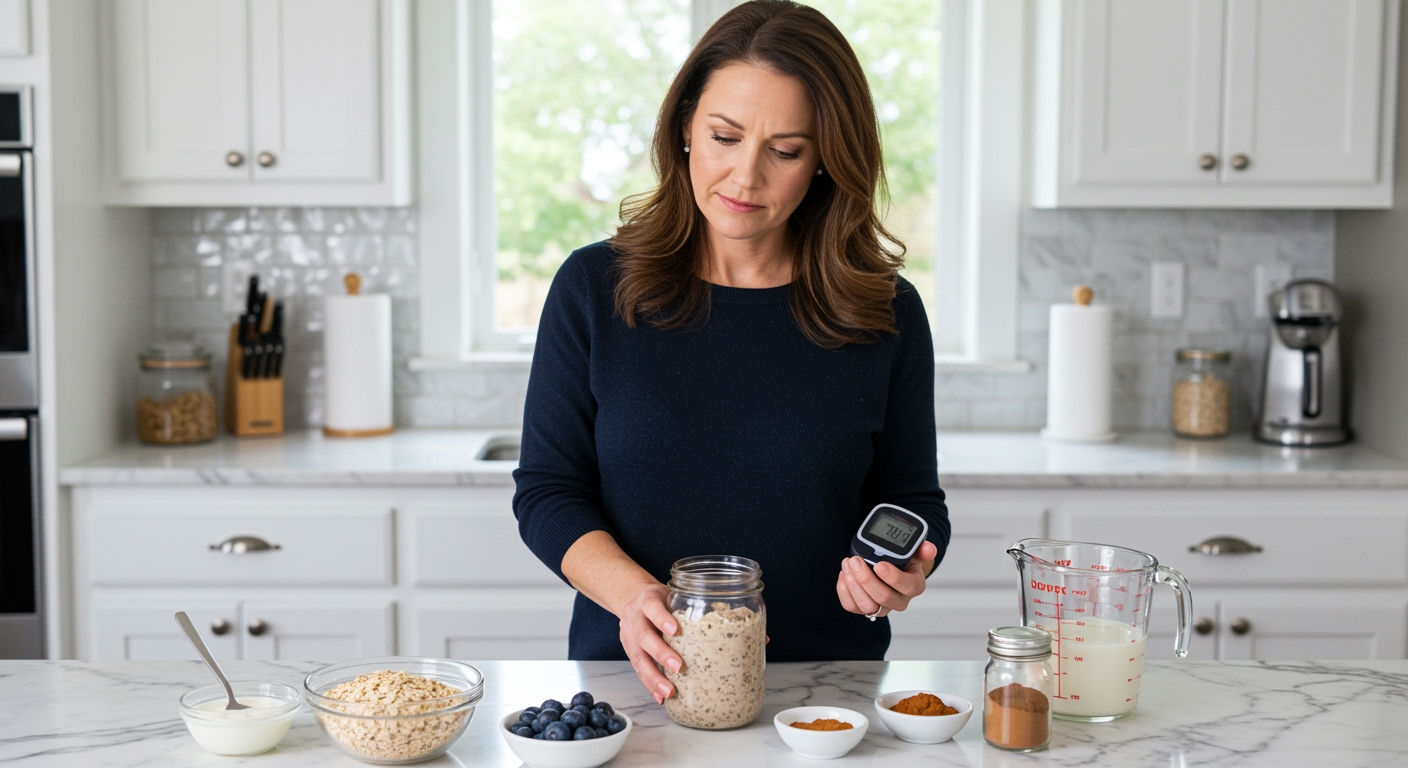✪ Key Takeaway: Overnight oats can be good for diabetes when prepared with protein, fiber, and healthy fats to slow sugar absorption.
Introduction
You wake up craving something sweet and satisfying, but your blood sugar monitor reminds you that breakfast choices matter more than ever.
Many people with diabetes wonder if overnight oats are a safe breakfast option because they seem healthy but contain carbohydrates that could spike blood sugar levels.
Hi, I’m Abdur, your nutrition coach and today I’m going to explain how overnight oats affect blood sugar and share the best ways to prepare them for diabetes management.
How Do Overnight Oats Affect Blood Sugar?
Overnight oats contain complex carbohydrates that break down into glucose during digestion, which directly impacts your blood sugar levels.
The soaking process changes the structure of oat starches, making them easier for your digestive enzymes to break down into simple sugars.
However, oats also contain beta-glucan fiber, a soluble fiber that forms a gel-like substance in your stomach and slows down sugar absorption.
Research shows that beta-glucan can reduce post-meal blood sugar spikes by up to 30% compared to other breakfast cereals.
The key difference lies in how you prepare your overnight oats because added ingredients can either help stabilize or dramatically increase blood sugar response.
✪ Fact: One cup of cooked oats contains about 28 grams of carbohydrates and 4 grams of fiber.
What Makes Overnight Oats Diabetes-Friendly?
The protein content in your overnight oats determines how quickly your blood sugar rises after eating them.
Adding Greek yogurt, protein powder, or nuts increases the protein content, which slows down gastric emptying and glucose absorption.
Healthy fats from sources like chia seeds, flaxseeds, or nut butter create an even stronger blood sugar buffering effect by further slowing digestion.
The fiber combination from oats plus added ingredients like berries or ground flaxseed creates a powerful glucose-stabilizing effect.
Portion control remains crucial because even healthy overnight oats can raise blood sugar if you eat too much at once.
The ideal serving size for most people with diabetes is about half a cup of dry oats, which provides roughly 150 calories and 27 grams of carbohydrates.
✪ Pro Tip: Aim for at least 15 grams of protein in your overnight oats to maximize blood sugar stability.
Which Ingredients Should You Avoid?
Added sugars in any form will cause rapid blood sugar spikes that can be dangerous for people with diabetes.
Honey, maple syrup, brown sugar, and even natural sweeteners like dates contain concentrated fructose that bypasses normal glucose regulation.
Dried fruits like raisins, cranberries, or banana chips pack concentrated sugars that can turn healthy overnight oats into a blood sugar bomb.
Flavored yogurts often contain hidden sugars that can add 15-20 grams of extra carbohydrates to your breakfast without you realizing it.
Instant oats process faster than steel-cut or rolled oats, leading to quicker blood sugar rises that are harder to control.
Fruit juices used as liquid bases contain concentrated sugars without the fiber benefits of whole fruits, making them particularly problematic for diabetes management.
✪ Note: Always check labels on flavored ingredients as they often contain hidden sugars that can derail blood sugar control.
What Are The Best Diabetes-Friendly Recipes?
Start with steel-cut oats as your base because they have the lowest glycemic impact and provide sustained energy release.
Mix in plain Greek yogurt for protein, unsweetened almond milk for creaminess, and a tablespoon of ground flaxseed for extra fiber and omega-3 fats.
Add fresh berries like blueberries or strawberries because they provide antioxidants and natural sweetness with minimal blood sugar impact.
Include a small amount of nuts or nut butter for healthy fats that will keep you satisfied and help maintain stable glucose levels throughout the morning.
Cinnamon not only adds flavor but also contains compounds that may help improve insulin sensitivity and glucose metabolism.
Chia seeds expand when soaked and create a pudding-like texture while adding protein, fiber, and healthy fats that support blood sugar control.
For sweetness without sugar spikes, try a small amount of stevia or monk fruit sweetener, which do not affect blood glucose levels.
✪ Pro Tip: Prepare multiple jars at once and store them in the refrigerator for up to four days for convenient healthy breakfasts.
When Should You Test Your Blood Sugar?
Test your blood sugar before eating overnight oats to establish your baseline glucose level for that morning.
Check again two hours after finishing your breakfast to see how your body responded to the specific recipe you prepared.
Your blood sugar should not rise more than 40-50 mg/dL above your pre-meal level if the overnight oats are properly balanced for your needs.
Keep a food diary noting which ingredients and portion sizes work best for maintaining stable glucose levels in your individual case.
If your blood sugar spikes above 180 mg/dL after eating overnight oats, you need to adjust the recipe by reducing portion size or adding more protein and fiber.
Some people with diabetes find that eating overnight oats earlier in the day leads to better glucose tolerance than having them later.
✪ Fact: Individual responses to the same foods can vary significantly, making personal testing essential for diabetes management.
The Bottom Line
Overnight oats can be an excellent breakfast choice for people with diabetes when prepared thoughtfully with protein, healthy fats, and fiber-rich ingredients.
The key to diabetes-friendly eating is not avoiding foods but learning how to prepare them in ways that support your health goals.
I would love to hear about your experiences with overnight oats and diabetes management, so please share your questions, favorite recipes, or blood sugar responses in the comments below.
References
At NutritionCrown, we use quality and credible sources to ensure our content is accurate and trustworthy. Below are the sources referenced in creating this article:





